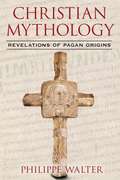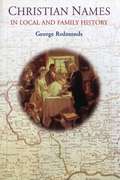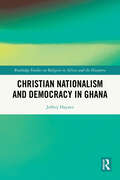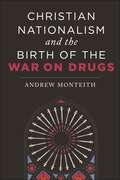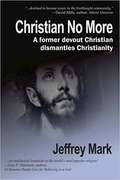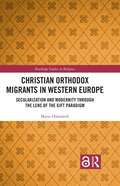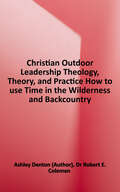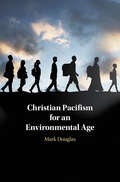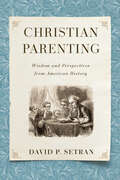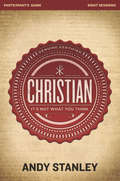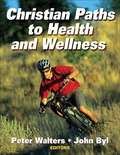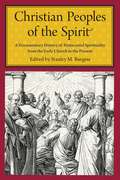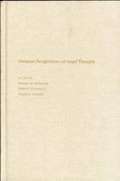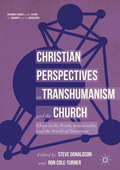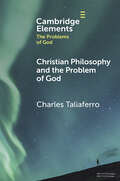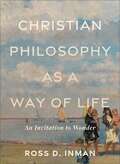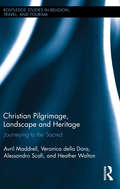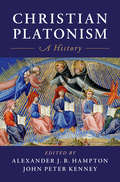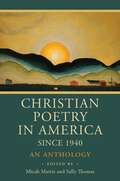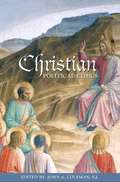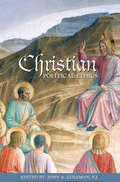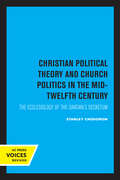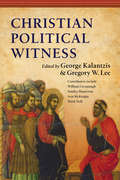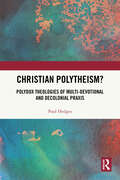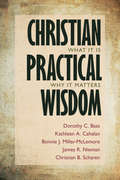- Table View
- List View
Christian Mythology: Revelations of Pagan Origins
by Claude Lecouteux Philippe WalterReveals how Christian mythology has more to do with long-standing pagan traditions than the Bible • Explains how the church fathers knowingly incorporated pagan elements into the Christian faith to ease the transition to the new religion • Identifies pagan deities that were incorporated into each of the saints • Shows how all the major holidays in the Christian calendar are modeled on pagan rituals and myths, including Easter and Christmas In this extensive study of the Christian mythology that animated Europe in the Middle Ages, author Philippe Walter reveals how these stories and the holiday traditions connected with them are based on long-standing pagan rituals and myths and have very little connection to the Bible. The author explains how the church fathers knowingly incorporated pagan elements into the Christian faith to ease the transition to the new religion. Rather than tear down the pagan temples in Britain, Pope Gregory the Great advised Saint Augustine of Canterbury to add the pagan rituals into the mix of Christian practices and transform the pagan temples into churches. Instead of religious conversion, it was simply a matter of convincing the populace to include Jesus in their current religious practices. Providing extensive documentation, Walter shows which major calendar days of the Christian year are founded on pagan rituals and myths, including the high holidays of Easter and Christmas. Examining hagiographic accounts of the saints, he reveals the origin of these symbolic figures in the deities worshipped in pagan Europe for centuries. He also explores how the identities of saints and pagan figures became so intermingled that some saints were transformed into pagan incarnations, such as Mary Magdalene’s conversion into one of the Celtic Ladies of the Lake. In revealing the pagan roots of many Christian figures, stories, and rituals, Walter provides a new understanding of the evolution of religious belief.
Christian Names in Local and Family History
by George RedmondsSurnames have always provided key links in historical research. This groundbreaking new work shows that first names can also be highly significant for those tracing genealogies or studying communities. Standard works on first names have always concentrated on etymology. George Redmonds goes much further: he believes that every name has a precise origin and history of expansion, which can be regional or even local; up to c. 1700 it may even have centred on one family. This text fully explores the implications of this belief for local and family history, and challenges many published assumptions on the historical frequency of first names.
Christian Nationalism and Democracy in Ghana (Routledge Studies on Religion in Africa and the Diaspora)
by Jeffrey HaynesThis book investigates the impact of Christian nationalism on democracy in Ghana, arguing that proponents of a specific Christian worldview seek to remake the country according to their values and beliefs.Christian nationalism is a significant religious and political ideology in several African countries, not only Ghana, but also Zambia and Nigeria. In Ghana, prominent Christian nationalists, encouraged by sections of the American Christian Right, cultivate political influence with powerful political elites and by developing a high media profile to promote their views and increase their numbers of followers. The book examines specific examples of Christian nationalism’s impact on Ghana’s democracy: the national cathedral as a symbol of national unity and social cohesion, anti-Muslim pronouncements threatening inter-faith harmony, and attacks on Ghana’s LGBTQ+ community. Overall, the book argues that Christian nationalism is a specific threat to Ghana’s three decade-long liberal democracy, with the aim of undermining the constitutional equality and human rights of some Ghanaians in favour of a specific Christian worldview.This book will be of interest to researchers of religion and politics in Africa, with Ghana serving as an important case study for those interested in the regional impact of Christian nationalism.
Christian Nationalism and the Birth of the War on Drugs
by Andrew MonteithRecovers the religious origins of the War on DrugsMany people view the War on Drugs as a contemporary phenomenon invented by the Nixon administration. But as this new book shows, the conflict actually began more than a century before, when American Protestants began the temperance movement and linked drug use with immorality.Christian Nationalism and the Birth of the War on Drugs argues that this early drug war was deeply rooted in Christian impulses. While many scholars understand Prohibition to have been a Protestant undertaking, it is considerably less common to consider the War on Drugs this way, in part because racism has understandably been the focal point of discussions of the drug war. Antidrug activists expressed—and still do express--blatant white supremacist and nativist motives. Yet this book argues that that racism was intertwined with religious impulses. Reformers pursued the “civilizing mission,” a wide-ranging project that sought to protect “child races” from harmful influences while remodeling their cultures to look like Europe and the United States. Most reformers saw Christianity as essential to civilization and missionaries felt that banning drugs would encourage religious conversion and progress. This compelling work of scholarship radically reshapes our understanding of one of the longest and most damaging conflicts in modern American history, making the case that we cannot understand the War on Drugs unless we understand its religious origins.
Christian No More: On Leaving Christianity, Debunking Christianity, And Embracing Atheism And Freethinking
by Jeffrey MarkThis book is for everyone: Atheists will find excellent arguments to help them defend their positions; Agnostics will appreciate the clarification it brings; Christians who are struggling will find this book a great help in breaking free from their shackles as they learn exactly why there's no possible way Christianity is true and why they don't have to worry ever again. The Bible says that the world's languages began with the Tower of Babel. Today we know better. But how could the Bible contain stories that aren't true? Author Jeffrey Mark was a devout Christian throughout his life until, during his early 30s, he began studying the Bible more seriously than he ever had. And that's when he made the disturbing realization that so many stories were simply untrue. For him, this realization started with the Tower of Babel. That in turn launched a series of events that eventually led him to abandon his long-held beliefs. Go into the mind of a former Christian. Understand why he believed what he did, why it was so hard to let go, and why, after understanding the truth about the Bible, he ultimately had no choice but to stop believing. Travel with him as you see how Christianity and Judaism rehash older beliefs that have long been written off as mythical. Find out how the Bible in its original form spoke of multiple gods creating the Earth, and how the dearly-held beliefs of today's Christians bear no resemblance to the Bible's stories in their original form. As you take a journey into reason and the scientific method, find out why there is simply no possible way Christianity's teachings can be true, and why we live in a universe that is guided by science--not by a god and his mythical son who rose from the dead.
Christian Orthodox Migrants in Western Europe: Secularization and Modernity through the Lens of the Gift Paradigm (Routledge Studies in Religion)
by Maria HämmerliChristian Orthodox Migrants in Western Europe: Secularization and Modernity through the Lens of the Gift Paradigm explores a religious community that has been getting increasing scholarly attention. While most of the literature in the field looks at this religious tradition in terms of its alleged inability to come to terms with modernity – due to its specific religious institutions, practices and dogma – this book takes a step back from such Western-centered and Protestant-biased analysis of religion. It addresses Orthodoxy’s recent encounter with the West, modernity and secularization in the process of post-communist migrations from Eastern Europe, revealing the complicated identity redefinition and re-compositions of a religious group that highly values continuity, tradition, and ethnic/national belonging. Using socio-anthropological qualitative research on Romanian, Russian, Greek and Serbian Orthodox migrants in Western Europe in a comparative perspective, this volume grasps the interplay between the institutional and the individually lived aspects of religion in their relation to the increasingly secular "conditions of belief" in Western European host countries. This book is important for those studying or researching Orthodox Christianity, religion and migration, secularization and modernity, as well as those in related disciplines such as sociology, anthropology of religion, religious studies, political science, migration studies, cultural studies.
Christian Outdoor Leadership: Theology, Theory, and Practice
by Ashley DentonAshley Denton’s book on Christian outdoor leadership is the first of its kind. Christian Outdoor Leadership: Theology, Theory, and Practice offers a relevant and innovative approach to leadership development, evangelism, discipleship, and spiritual formation through outdoor adventure. People today are eager for more experiential approaches to learning. This book re-asserts Jesus’ experiential apprenticeship strategy by incorporating outdoor adventure into ministry like he did. Few books on evangelism or discipleship probe the outdoor dimension of Jesus’ apprenticeship methods, and this book fills that gap. <p><p>This book builds on Dr. Robert Coleman’s classic Master Plan of Evangelism by addressing an element of Jesus’ apprenticeship strategy that has been given too little attention: The outdoor setting and timing were often the crucial elements of His teaching that fueled radical change of heart. Jesus often coupled his teaching with adventurous outdoor experiences to facilitate experiential learning. This is exactly what many people are hungry for today. Let Christian Outdoor Leadership: Theology, Theory, and Practice introduce you to a new way of making disciples that are profoundly anchored in Jesus ancient style of apprenticeship, utilizing experiential learning and outdoor adventure as a catalyst for transformation.
Christian Pacifism for an Environmental Age
by Mark DouglasIn this volume, Mark Douglas offers a new vision of the history of Christian pacifism within the context of a warming world. He narrates this story in a way that recognizes the complexities of the tradition and aligns it with a coherent theological vision, one that shapes the tradition to encompass the new causes and types of wars fought during the Anthropocene. Along the way, Douglas draws from research in historical climatology to recover the overlooked role that climate changes have always played in shaping not only the Christian pacifist tradition but also the movement of traditions through western history. Scholars across a range of disciplines - peace studies, Christian theology and history, environmentalism, and environmental conflict studies - will benefit from this model of critical and charitable engagement with the complex history of Christian pacifism, the resources of which will be important for addressing wars in a warming world.
Christian Parenting: Wisdom and Perspectives from American History
by David P. SetranWhat can the past teach us about what it means to be a &“good&” Christian parent today? Today&’s parenting guidance can sometimes feel timeless and inviolable—especially when it comes to the spiritual formation of children in Christian households. But even in the recent past, parenting philosophies have differed widely among Christians in ways that reflect the contexts from which they emerged. In this illuminating historical study, David Setran catalogs the varying ways American Protestants envisioned the task of childrearing in the seventeenth, eighteenth, and nineteenth centuries. Comparing two main historical time periods—the colonial era and the Victorian era—Setran uncovers common threads, opposing viewpoints, and the cultural and religious influences behind the dominant parenting &“postures&” of each era. The implications of his findings matter for today&’s big questions about parenting:Should children be viewed as basically good, in need of protection from corruption, or as fundamentally sinful, in need of moral correction?How should parents address misbehavior?Should a parent&’s primary role be that of teacher, disciplinarian, or nurturer?What importance should be attributed to devotions and prayer, church involvement, Sabbath-keeping, home decorating, and fun family activities?What consideration should be given to gender? Should boys and girls be raised differently? Do mothers and fathers have essentially different responsibilities?As he surveys these historical perspectives, Setran reflects on the legacy and future of Christian parenting, concluding that the Protestant heritage encourages the importance of intentional devotional practices, the development of close parent-child bonds, and the creation of godly household environments. In the end, he argues that all of these historical values are critical to the full expression of Christian parental love. This is a love that teaches because it wants to help children understand true goodness; that admonishes and restrains because it wants to protect children from whatever keeps them from true pleasure and joy; that fosters strong relationships so children might experience the lavishness of God&’s love; that models Christlike sacrifice and guides children into the arms of their Creator.
Christian Participant's Guide: It's Not What You Think
by Andy StanleyWhat does it mean to be a Christian? Ask 100 people that question and you are likely to get 100 different answers. One reason people have such difficulty defining what a Christian should be is that the Bible never gives a definition. The followers of Jesus did not defer to themselves as Christians, it was a label placed on them from the outside. The early believers called themselves disciples, and the Bible is very clear in defining what a disciple looks like. Jesus gave his disciples one word that should define them. What if we as his followers embodied this one word? What if our behavior was so consistent with this word that folks around us were drawn to us - and to God? In Christian, you will learn: What one word should be descriptive of every disciple How Jesus followers should treat those who are outside the faith Why people love Jesus but can’t stand his followers This participant’s guide with help you engage the teaching from Andy Stanley on the corresponding DVD and includes discussion questions for individuals and/or small groups, between-session devotions, DVD teaching overviews, and a leader’s guide. In this eight-session small group study, Andy challenges us to change the name and reputation of Christianity by becoming a group of followers characterized by one thing — Love.
Christian Paths to Health and Wellness
by Peter Walters John BylMost Christian college instructors have taught health and wellness from books that are not God-centered, simply because they have had no choice. Thanks to the development of Christian Paths to Health and Wellness,instructors can empower students to take responsibility and initiative for their own health, fitness, and wellness as part of their daily lives--while offering that instruction in a Christian context. Driven by 1 Corinthians 3:16 ("Don't you know that you yourselves are God's temple and that God's Spirit lives in you?"), this practical text is based on sound, cutting-edge scientific research and Christian principles. As such, it provides an exciting new approach to teaching health and wellness to help meet part of the Christian college mission. Students will glean these benefits from the text: -A solid foundation in health and wellness theory and research -Multiple Christian perspectives that create a balanced approach to health and wellness across a broad spectrum of Christian beliefs -Study aids, including vocabulary lists, glossary definitions, chapter-opening objectives, and chapter-ending questions, which foster learning and application of the material In addition, Christian Paths to Health and Wellness comes with many instructional aids that are free to course adopters, including Web support with sample course syllabi, a presentation package, and a test package. These aids will help instructors streamline their preparation time while teaching and managing their courses. Written by six contributing experts and edited by two highly respected Christian college instructors, this book stems from the contributors' own experiences in meeting the challenges of teaching in today's Christian colleges. It includes point/counterpoint discussions examining issues students face today, and it provides hope, practical tools and methods for change, and a comprehensiveness that enables students to make gradual and significant permanent change through the wisdom of education and the power of the Holy Spirit. The book focuses on four major themes: how we are made, how we are made to move, how we are to be nourished, and how we are to behave in restful ways. In part I, students are introduced to biblical reasons to value their wellness and examine God's purpose and their own life's mission. They explore body image, eating disorders, and weight management in part II. In part III, students learn about the basics of fitness, including cardiorespiratory, muscular, and flexibility assessment and training. Part IV focuses on nutritional and emotional health and wellness and also looks at wellness as it relates to sleep habits and personal relationships. Part V encourages students to develop a comprehensive strategy to maintain personal wellness in a relationship with God. Through Christian Paths to Health and Wellness,students will learn about and practice making choices that have positive effects on their lifelong fitness and wellness. Students will become aware of physical wellness issues and develop a passion for proactive and permanent lifestyle changes. And they will do it all with a God-centered approach.
Christian Peoples of the Spirit: A Documentary History Of Pentecostal Spirituality from the Early Church to the Present
by Stanley M. BurgessAmong all groups in Christendom, the Pentecostal/Charismatic movement is second in size only to the Roman Catholic Church, with growth that shows no signs of abatement. Its adherents declare the Pentecostal Movement, which began at Azusa Street in 1906, to be unprecedented in Christian history since the first century of the Church in its embrace of manifestations of the Holy Spirit such as divine healing, miracles, and speaking in tongues. Yet although it may be unprecedented in size and rate of growth, Stanley M. Burgess argues that is hardly unprecedented in concept. In Christian Peoples of the Spirit, Burgess collects documentary evidence for two thousand years of individuals and groups who have evidenced Pentecostal/charismatic-like spiritual giftings, worship, and experience. The documents in this collection, bolstered by concise editorial introductions, offer the original writings of a wide variety of "peoples of the spirit," from Tertullian and Antony of the Desert to the Shakers and Sunder Singh, as well as of their enemies or detractors. Though virtually all of the parties in this volume considered themselves Spirit-gifted, or given special qualities by God, they are in many ways as different from one another as the cultures from which they have emerged. In providing such an impressive array of voices, Burgess convincingly demonstrates that there have indeed been Spirit-filled worship and charismatic saints in all periods of church history.
Christian Perspectives on Legal Thought
by Michael W. Mcconnell Robert F. Cochran Angela C. CarmellaDifferent American legal scholars have joined together to produce 'Christian Perspectives On Legal Thought', a book that views legal thought from various Christian perspectives.
Christian Perspectives on Transhumanism and the Church: Chips In The Brain, Immortality, And The World Of Tomorrow (Palgrave Studies In The Future Of Humanity And Its Successors Ser.)
by Steve Donaldson Ron Cole-TurnerChristians have always been concerned with enhancement—now they are faced with significant questions about how technology can help or harm genuine spiritual transformation. What makes traditional and technological enhancement different from each other? Are there theological insights and spiritual practices that can help Christians face the challenge of living in a technological world without being dangerously conformed to its values? This book calls on Christians to understand and engage the deep issues facing the church in a technological, transhumanist future.
Christian Philosophy and the Problem of God (Elements in the Problems of God)
by Charles TaliaferroQuestions are raised about Christian philosophy and God. Is Christian philosophy truly philosophical? Is it Biblical? Is it capable of addressing God, a profoundly transcendent being? Does appealing to a God's eye point of view make sense? Can Christian philosophy respect religious diversity? While the integrity of Christian philosophy is defended, questions are raised about its relationship to the overall practice of philosophy. Christian philosophers value drawing others to Christian faith. Are Christian apologetics compatible with philosophy? This Element concludes with reflection on when it may be philosophically acceptable to appeal to mystery.
Christian Philosophy as a Way of Life: An Invitation to Wonder
by Ross D. InmanThis brief, accessible introduction shows that philosophy is valuable, practical, and significant for every aspect of Christian life and ministry. Philosophy is often seen as anything but practically relevant to everyday life. In this brief, accessible introduction, Ross Inman explores four hidden assumptions that lurk behind questions involving philosophy's relevance. He shows that philosophy is one of most practical subjects of study, for it satisfies our deep human need to make sense of it all. <P><P>This book recovers a more classical vision of Christian philosophy as an entire way of life. Inman shows that wonder is the distinctively human posture that drives and sustains the examined life and makes a compelling case that philosophy is valuable, practical, and significant for every aspect of Christian life and ministry. Living philosophically as a Christian enables us to be properly attuned to what is true and good in Christ and to orient our lives to the highest goals worth pursuing. This is an ideal introductory book for students of philosophy, Christian thought, and worldview studies. It will also work well in classical school, high school, and homeschool contexts.
Christian Pilgrimage, Landscape and Heritage: Journeying to the Sacred (Routledge Studies in Pilgrimage, Religious Travel and Tourism)
by Avril Maddrell Heather Walton Veronica della Dora Alessandro ScafiThis volume provides a theoretically and empirically-grounded study of the significance of landscape in the experience of Christian pilgrimage across different denominations and its intersection with cultural heritage and tourism. The book focuses on pilgrimages to Meteora (Greece), Subiaco (Italy) and the Isle of Man. These are each sites of scenic beauty that boast a rich heritage associated respectively to Greek Orthodox, Roman Catholic and Ecumenical/ Protestant denominations. The study discusses different Christian theologies, practices and perspectives on the nature and the purpose of pilgrimage in these traditions. It draws on participant experiential accounts, archival research, and interviews with clergy, laity and local stakeholders. Special attention is paid to the themes of sacred space and practice, aesthetics, mobilities, embodiment and performance, emotional geographies, theology, cultural heritage, consumption and commodification, and the pilgrim-tourist continuum.
Christian Platonism: A History
by John Peter Kenney Hampton, Alexander J. B.Platonism has played a central role in Christianity and is essential to a deep understanding of the Christian theological tradition. At times, Platonism has constituted an essential philosophical and theological resource, furnishing Christianity with an intellectual framework that has played a key role in its early development, and in subsequent periods of renewal. Alternatively, it has been considered a compromising influence, conflicting with the faith's revelatory foundations and distorting its inherent message. In both cases the fundamental importance of Platonism, as a force which Christianity defined itself by and against, is clear. Written by an international team of scholars, this landmark volume examines the history of Christian Platonism from antiquity to the present day, covers key concepts, and engages issues such as the environment, natural science and materialism.
Christian Poetry in America Since 1940: An Anthology
by Sally Thomas Micah MattixWinner of the 2023 Christianity Book Award — Culture & The Arts!"One of the best, and least expected, anthologies in decades." —Joseph Bottum, Poetry editor, New York SunShowcasing thirty-five American poets born in or after 1940, this anthology confirms that one of the most vibrant developments in contemporary verse has been a renewed engagement with the Christian faith. Across a full spectrum of Christian belief, including the struggle to believe at all, these poets bring the power of their art to bear on serious questions: how to understand the goodness of God in a fallen and tragic world, how to reconcile universal truths with the particularities of human experience, how to render familiar events of salvation history in new language that generates its own epiphanies. As Christian engagement assumes a multiplicity of modes and voices, so does contemporary poetry in America. This volume, then, selective yet representative, features the work of early-, mid-, and late-career poets, formalists, free-verse poets, and experimenters in prosody. This anthology bears witness to the poetic mind as it seeks that which is above.
Christian Political Ethics
by John A. ColemanChristian Political Ethics brings together leading Christian scholars of diverse theological and ethical perspectives- Catholic, Lutheran, Calvinist, and Anabaptist- to address fundamental questions of state and civil society, international law and relations, the role of the nation, and issues of violence and its containment. Representing a unique fusion of faith-centered ethics and social science, the contributors bring into dialogue their own varying Christian understandings with a range of both secular ethical thought and other religious viewpoints from Judaism, Islam, and Confucianism. They explore divergent Christian views of state and society- and the limits of each. They grapple with the tensions that can arise within Christianity over questions of patriotism, civic duty, and loyalty to one's nation, and they examine Christian responses to pluralism and relativism, globalization, and war and peace. Revealing the striking pluralism inherent to Christianity itself, this pioneering volume recasts the meanings of Christian citizenship and civic responsibility, and raises compelling new questions about civil disobedience, global justice, and Christian justifications for waging war as well as spreading world peace. It brings Christian political ethics out of the churches and seminaries to engage with today's most vexing and complex social issues.
Christian Political Ethics (Ethikon Series in Comparative Ethics)
by John A. ColemanChristian Political Ethics brings together leading Christian scholars of diverse theological and ethical perspectives--Catholic, Lutheran, Calvinist, and Anabaptist--to address fundamental questions of state and civil society, international law and relations, the role of the nation, and issues of violence and its containment. Representing a unique fusion of faith-centered ethics and social science, the contributors bring into dialogue their own varying Christian understandings with a range of both secular ethical thought and other religious viewpoints from Judaism, Islam, and Confucianism. They explore divergent Christian views of state and society--and the limits of each. They grapple with the tensions that can arise within Christianity over questions of patriotism, civic duty, and loyalty to one's nation, and they examine Christian responses to pluralism and relativism, globalization, and war and peace. Revealing the striking pluralism inherent to Christianity itself, this pioneering volume recasts the meanings of Christian citizenship and civic responsibility, and raises compelling new questions about civil disobedience, global justice, and Christian justifications for waging war as well as spreading world peace. It brings Christian political ethics out of the churches and seminaries to engage with today's most vexing and complex social issues. The contributors are Michael Banner, Nigel Biggar, Joseph Boyle, Michael G. Cartwright, John A. Coleman, S.J., John Finnis, Theodore J. Koontz, David Little, Richard B. Miller, James W. Skillen, and Max L. Stackhouse.
Christian Political Theory and Church Politics in the Mid-Twelfth Century: The Ecclesiology of the Gratian's Decretum
by Stanley ChodorowThis title is part of UC Press's Voices Revived program, which commemorates University of California Press’s mission to seek out and cultivate the brightest minds and give them voice, reach, and impact. Drawing on a backlist dating to 1893, Voices Revived makes high-quality, peer-reviewed scholarship accessible once again using print-on-demand technology. This title was originally published in 1972.
Christian Political Witness (Wheaton Theology Conference Series)
by Gregory W. Lee George KalantzisContributors include:Stanley HauerwasMark NollScot McKnightTimothy G. GombisGeorge KalantzisJana Marguerite BennettWilliam T. CavanaughPeter J. LeithartDaniel M. Bell Jr.Jennifer M. McBrideDavid P. GusheeBishop David Gitari
Christian Polytheism?: Polydox Theologies of Multi-devotional and Decolonial Praxis
by Paul HedgesThis book is a theological and political exploration of how Christianity may be compatible with polytheism, arguing that there is no singular "orthodoxy", rather we see "polydoxy".Conceptually deconstructing the distinction between monotheism and polytheism, it advances multi-devotionalism and mono-devotionalism as analytically preferable terminology. It starts by exploring notions of polytheism in the Old(er) Testament, New(er) Testament, and Christian developments of the Trinity over subsequent centuries, before placing Christianity in comparative dialogue with Islam, Judaism, and Hinduism. Employing a decolonial and feminist stance, the book proceeds to examine global Christianities, focusing on African and Asian theologies as well as Goddess traditions. It concludes by offering five options for developing a theology of Christian polytheism: Henotheist originalism, theologies of plurality, generous orthodoxy, atheistic Christian polytheism, and a theology of polytheistic excess.This original and compelling volume is essential reading for scholars of Christian Systematic Theology and Modern Theology.
Christian Practical Wisdom: What It Is, Why It Matters
by Dorothy C. Bass Bonnie J. Miller-McLemore Kathleen A. Cahalan Christian B. Scharen James R. NiemanIn this richly collaborative work, five distinguished scholars examine the oft-neglected embodied practical wisdom that is essential for true theological understanding and faithful Christian living. After first showing what Christian practical wisdom is and does in several real-life situations, the authors tell why such practical wisdom matters and how it operates, exploring reasons behind its decline in both the academy and the church and setting forth constructive cases for its renewal.
